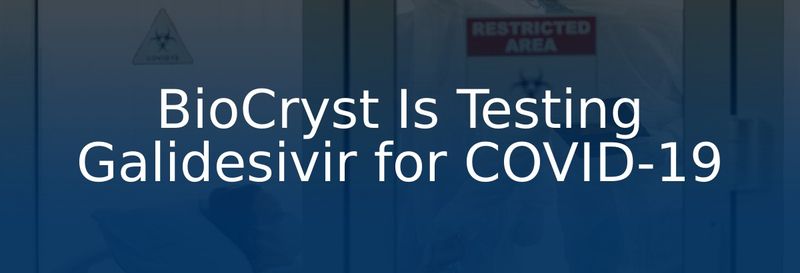Galidesivir Stops Zika Viral Replication in Primate Model

RESEARCH TRIANGLE PARK, N.C., June 10, 2020 (GLOBE NEWSWIRE) -- BioCryst Pharmaceuticals, Inc. (Nasdaq:BCRX) today announced new data published in Science Translational Medicine show, in a primate model, that galidesivir was safe, provided post-exposure prevention of Zika viral replication across a range of doses, and rapidly reduced viral loads to undetectable levels when dosed up to 72 hours after infection with Zika virus.
“Galidesivir reduced Zika virus replication from the first dose administered without impairing the adaptive immune response that protects against subsequent infection. These data provide an encouraging foundation for studying SARS-CoV-2, another RNA-replicating virus, in this same animal species,” said James B. Whitney, Ph.D., assistant professor of medicine at Harvard Medical School and lead author of the study.
“The rapid reduction in Zika viral load we see in this robust animal model further demonstrates the broad antiviral potential of galidesivir against multiple pathogens. The current COVID-19 pandemic has reinforced the urgent global need for effective broad-spectrum antiviral therapies to combat these outbreaks,” said Dr. William Sheridan, chief medical officer of BioCryst.
Galidesivir is an investigational broad-spectrum antiviral drug that was safe and well tolerated in previously reported Phase 1 trials in healthy subjects. Galidesivir has demonstrated broad-spectrum activity in vitro against more than 20 RNA viruses in nine different families, including the coronaviruses that cause MERS and SARS. A Phase 1 trial to assess the safety, clinical impact and antiviral effects of galidesivir in patients with COVID-19 is currently enrolling patients across multiple sites in Brazil.
Zika Study Details
In the Zika virus study of galidesivir, 70 Rhesus macaques were studied with different routes of infection, different doses of galidesivir, and galidesivir treatment initiated at different time points after infection. Endpoints included Zika virus RNA quantity in plasma, saliva, urine, and cerebrospinal fluid (CSF), and a variety of immunologic measurements, including antibody seroconversion to Zika virus. Galidesivir was safe and showed robust antiviral activity at all stages of Zika infection and at multiple different doses. Zika-infected animals that were treated with galidesivir developed an immune response to Zika that was protective against subsequent Zika re-challenge.
About Galidesivir (BCX4430)
Galidesivir, a broad-spectrum antiviral drug, is an adenosine nucleoside analog that acts to block viral RNA polymerase. It is in advanced development for the treatment of COVID-19, Marburg virus disease and Yellow Fever. Phase 1 clinical safety and pharmacokinetics trials of galidesivir by both intravenous and intramuscular routes of administration in healthy subjects have been completed. In animal studies, galidesivir has demonstrated activity against a variety of serious pathogens, including Ebola, Marburg, Yellow Fever and Zika viruses. Galidesivir has also demonstrated broad-spectrum activity in vitro against more than 20 RNA viruses in nine different families, including coronaviruses, filoviruses, togaviruses, bunyaviruses, arenaviruses, paramyxoviruses, and flaviviruses. BioCryst is developing galidesivir in collaboration with U.S. government agencies and other institutions.
About BioCryst Pharmaceuticals
BioCryst Pharmaceuticals discovers novel, oral, small-molecule medicines that treat rare diseases in which significant unmet medical needs exist and an enzyme plays a key role in the biological pathway of the disease. BioCryst has several ongoing development programs including berotralstat (BCX7353), an oral treatment for hereditary angioedema, BCX9930, an oral Factor D inhibitor for the treatment of complement-mediated diseases, galidesivir, a potential treatment for COVID-19, Marburg virus disease and Yellow Fever, and BCX9250, an ALK-2 inhibitor for the treatment of fibrodysplasia ossificans progressiva. RAPIVAB® (peramivir injection), a viral neuraminidase inhibitor for the treatment of influenza, is BioCryst's first approved product and has received regulatory approval in the U.S., Canada, Australia, Japan, Taiwan, Korea and the European Union. Post-marketing commitments for RAPIVAB are ongoing. For more information, please visit the Company's website at www.BioCryst.com.
Source: BioCryst Pharmaceuticals, Inc.
Posted: June 2020

